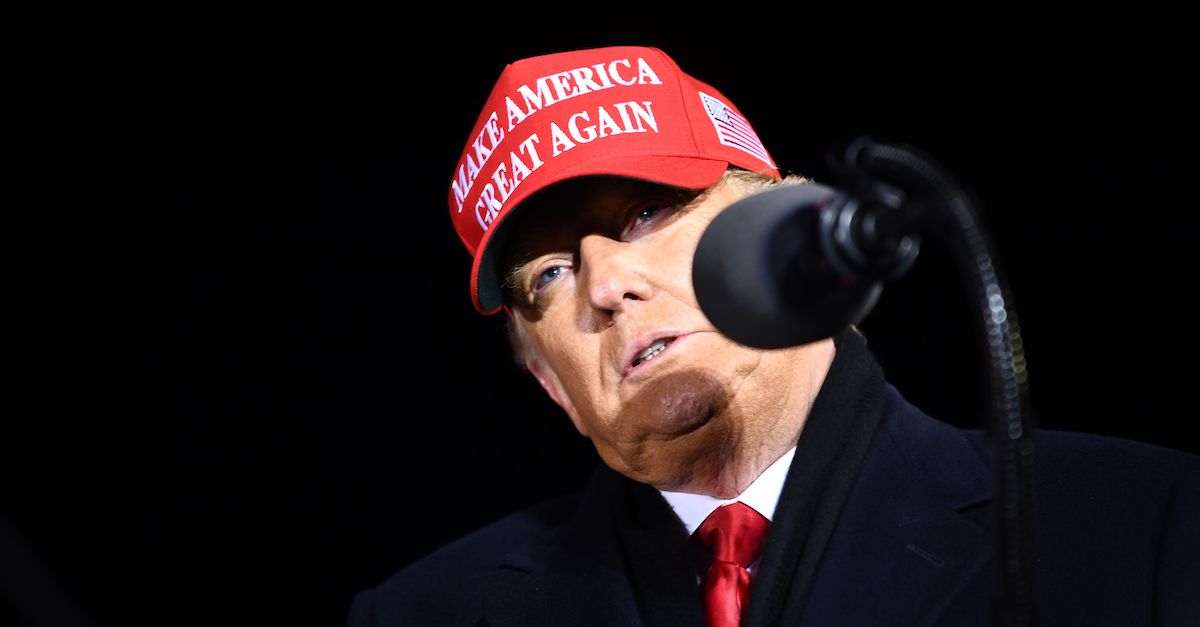
Donald Trump speaks during his final Make America Great Again rally of the 2020 U.S. Presidential campaign.
Former president Donald Trump has never been shy about his efforts and desires to overturn the results of the 2020 presidential election. Handwritten notes now confirm that Trump explicitly urged high-ranking figures in the U.S. Department of Justice to act on his whims last December, the House Oversight and Reform Committee revealed on Friday.
The nine pages of notes — summarizing a Dec. 27th call between Trump and his then-deputy attorney general Jeffrey A. Rosen — were written by Rosen’s deputy Richard P. Donoghue.
“Just say that the election was corrupt + leave the rest to me,” Trump allegedly told Rosen during a phone call, according to the summary. The New York Times first reported the exchange, though the Associated Press read the scribbling slightly differently.
“Just say the election was corrupt and leave the rest to me and the R. Congressmen,” an AP version of the story reports.
“[U]nderstand that the DOJ can’t + won’t snap its fingers + change the outcome of the election, doesn’t work that way,” Rosen is purported to have told Trump in response to his goading the DOJ to act on his and his supporters’ behalves.
“Don’t expect you to do that,” Trump said in response before asking Rosen to cast aspersions about the election’s integrity.
“We have an obligation to tell people that this was an illegal, corrupt election,” Trump reiterated during the teleconference.
Donoghue’s contemporaneous impressions of that the Dec. 27th phone call were released Friday by the House Oversight Committee and quickly prompted an avalanche of outrage from the Trump-critical public, politicians, and legal experts alike.
“This latest revelation confirms how perilous a situation the country was in,” attorney and Tulane Law Professor Ross Garber, who is considered an expert on impeachment and political investigations, told Law&Crime. “But again and again key public officials and institutions held the line. I expect there will be more disclosures and hopefully Congress will consider possible reforms, including reevaluating the Electoral Count Act.”
Under the Electoral Count Act (ECA) of 1887, Congress vests each state with the power to determine its own slate of electors for the Electoral College. Under the rules of the statute, states have something akin to primacy but in key circumstances those choices can be reviewed by Congress.
The relevant provision of the ECA is contained at 3 U.S.C. § 5 and says Congress must accept as valid any state’s final determination if their results are certified by the so-called “safe harbor” deadline.
As Law&Crime previously reported, however, some states may not be entitled to safe harbor status if there are outstanding legal disputes.
Trump’s alleged instructions to weaponize the DOJ to de-legitimize President Joe Biden‘s victory have ramped up calls for accountability, which observers quickly tied to the violent Jan. 6th siege of the U.S. Capitol.
“President Trump’s comments to Jeffrey Rosen and Richard P. Donoghue provide important context for the Capitol Insurrection,” University of Southern California Gould School of Law Professor and Vice Dean for Faculty and Academic Affairs Franita Tolson told Law&Crime. “These comments not only paint a picture of a president set on undermining the election results through multiple avenues, but one whose reckless disregard for the truth extended to using official channels to further the lie that fueled the violence on January 6th.”
“Trump’s repeated actions made us almost numb to a lot of misconduct – but this incident is truly remarkable,” GW Law Professor Randall D. Eliason tweeted.
Rachel Vindman, the wife of retired Lt. Col. Alexander Vindman, a key player in the first unsuccessful impeachment and removal effort against Trump, called for the former president to be punished:
We cannot move forward without #justice and #accountability. We can’t look the other way and ignore this problem. It’s time for Democrats to understand the power they have and use it. https://t.co/z2nODJKr9X
— Rachel Vindman (@natsechobbyist) July 30, 2021
Some legal experts, however, read much less into Trump’s comments to Rosen and Donoghue.
“While I disagree that the election was corrupt, the First Amendment protects Trump’s right to say it,” voluble Trump critic and federal criminal defense attorney Tor Ekeland told Law&Crime. “One is entitled to their opinion, no matter how foolish. The alternative is censorship of opinions deemed harmful, which historically hasn’t worked out well.”
Days after the Jan. 6th Commission launched its debut hearing, Congressional Democrats signaled that they intend to dig deeper and keep up some focus on the previous administration.
“These handwritten notes show that President Trump directly instructed our nation’s top law enforcement agency to take steps to overturn a free and fair election in the final days of his presidency,” House Oversight Committee Chair Carolyn Maloney (D-N.Y.) said in a press release. “The Committee has begun scheduling interviews with key witnesses to investigate the full extent of the former President’s corruption, and I will exercise every tool at my disposal to ensure all witness testimony is secured without delay.”
[image via BRENDAN SMIALOWSKI/AFP via Getty Images]